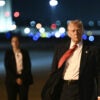The decision to cut Voice of America (VOA) Broadcasting to China has attracted a good deal of congressional attention, as well it should. While China has launched a worldwide public diplomacy and media offensive, the United States is looking at a greatly reduced international media presence if the projected cuts go through.
Last week, the Foreign Affairs Subcommittee on Oversight and Investigations under Representative Dana Rohrabacher (R–CA), asked, “Is America’s Overseas Broadcasting Undermining our National Interest and the Fight against Tyrannical Regimes?” If you ask the reporters and editors of the VOA’s Chinese service, who are on the cutting block, they would probably answer, “Yes.” Reporters and editors there are deeply distressed over having their work of decades summarily chopped.
Interestingly, at a time when the U.S. government is preparing to launch World Press Freedom Day on May 3, VOA itself did not cover the Rohrabacher hearings. (Radio Free Europe/Radio Liberty—which is also a U.S. government broadcaster—did, though, in very fair and balanced fashion.)
The Daily Signal depends on the support of readers like you. Donate now
According to the Obama Administration’s 2012 budget proposal, the Broadcasting Board of Governors (BBG) is proposing to cut 45 positions from the VOA Chinese service, effectively gutting its staff, at a saving of $8 million. The idea is “realigning its transmission network and resources,” focusing its resources on the VOA Web site and transferring remaining shortwave broadcasting capability to Radio Free Asia, another part of the U.S. international broadcasting system.
There is a model for the proposed strategy: VOA’s Russian service, whose broadcasting was ended 10 days before Russia’s invasion of Georgia in 2008 and never returned to the air. The Russian service Web site today is only a shadow of the former proud VOA presence, according to internal reports produced for the BBG itself. The Russian service is still in search of a niche, and it is often failing to cover the tough issues of Russia’s human rights violations, among them lack of press freedom. It is reasonable to assume that VOA’s Chinese service may well follow a similar path at a time when the Obama Administration is pursuing a “political reset” with global competitors like Russia and China. It should of course also be noted that the Internet in China is highly vulnerable to government censorship, interference, and outright control.
At the Rohrabacher hearing, Jon Lenczowski, president of the Institute on World Politics, made the following compelling argument for continued broadcasting:
“The Chinese service at the VOA should be preserved and strengthened” for a number of reasons, among them the rise of China as a major economic power, the accelerated rate of China’s military buildup, China’s massive intelligence operations in the U.S., China’s regional territorial claims, its regime’s refusal to undertake political reforms, and its ability to restrict modern social media.
Other parts of U.S. international broadcasting have also had to endure budget shortfalls. At Radio Free Europe/Radio Liberty (RFE/RL), a different set of savings were made that aim to protect reporters and broadcasters, who perform the core mission of broadcasting, combining their work with a well-designed Web site featuring their stories. On the site of RFE/RL’s research and analysis Newsline site, the following statement can be found.
Dear Newsline Subscriber:
The weakening U.S. dollar is placing our company, which broadcasts in 28 languages to 21 countries, under enormous budgetary pressure. I was faced with the difficult choice of scaling back RFE/RL’s broadcasting efforts or making cuts to our research and analysis capabilities. Because our core mandate is to broadcast uncensored information to parts of the world where free and independent media are fragile or nonexistent, I chose the latter.” Signed Jeffrey Gedmin, President, RFE/RL, Inc.
That core mandate of broadcasting to the parts of the world that do not have free or uncensored media is what seems to have been lost sight of at VOA’s leadership as tough budgetary times loom and as new technologies seem to offer a cost effective alternative. However, now that the U.S. Congress in its continuing resolution has given the Broadcasting Board of Governors $10 million of State Department funding for Internet freedom activities, perhaps the $8 million savings that the cut to the Chinese service would produce can be dispensed with and VOA’s mission be respected.






























